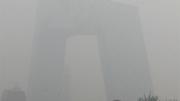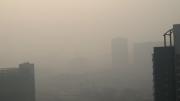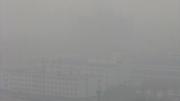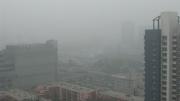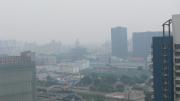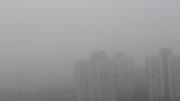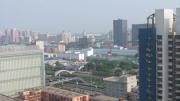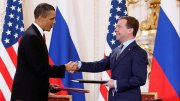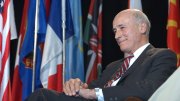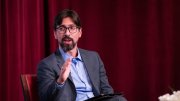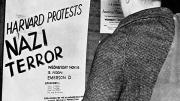The Olympics focused global attention generally on air pollution in China, and particularly on air quality in Beijing. For visual evidence of the state of the skies in Beijing, check the photographs and commentary provided below by James Fallows ’70, national correspondent (and blogger) for the Atlantic Monthly, who has been living in that city. For a look at how the use of current social-science and public-health techniques might spur efficient pollution-control policies in the entire country, read “Greening China,” by Mun S. Ho and Dale W. Jorgenson, in the September-October 2008 issue of Harvard Magazine.
On August 20, 2008, James Fallows reported:
Shortly after my wife and I moved from Washington, D.C., to Shanghai in July 2006, I visited Beijing to meet friends and do some interviews. I was sobered at the time by how heavy and smoggy the air seemed, with a ‘mere’ two years to go until the Olympic Games. I had grown up in Southern California, so I understood what a long, slow process the Los Angeles basin had gone through in making its air acceptable for the 1984 Olympics. And even then—as Beijing’s Olympic organizers were quick to point out—the marathon competition in LA had to be scheduled very early in the morning, and near the beach, to be sure the runners would be okay.
Through the fall of 2006 and early 2007 I came back to Beijing several times, and noticed that things didn’t seem to be getting dramatically better. The model I still had in mind was that of LA, where the Olympic events became the focus for a multiyear effort to change emission standards, shift industries, etc., to deal with the air. When we moved to Beijing last fall, I thought it would be worth taking pictures frequently: not every day, because I spent most of my time traveling to other parts of China, but as frequently as I could, to have some kind of benchmark.
We’ll see what happens with Beijing’s air in the long run, including when the Olympic emergency measures come off. In the short run, these patterns were apparent:
First, nature really is in charge. The clearest days were late last fall, when frigid, howling winds blew in from the northwest and pushed the stagnant air somewhere else. Second, for some reason, things seemed to be getting much worse, rather than much better, in the springtime before the games. Maybe industries were working overtime, in anticipation of mandatory shutdowns? I don’t know. But the worst days I had seen in Beijing over the last two years were in the two months before the Olympics. Third, this really was a just-in-time undertaking. The week of the opening ceremonies, the skies were as gray and heavy as they had ever been. The potential for embarrassment seemed real. But then (returning to point one) a cold front and attendant thunderstorms blew through and, after the first two or three days of the games, the skies were nicer than they had been in months.
People react to the skies in Beijing in different ways. The gray was so unrelenting this spring that my wife and I decided that once the Olympics and their special cleanup measures were over, we would leave the city for another part of China. I argued in a recent article in the Atlantic that the Chinese government and much of Chinese society now take pollution control seriously. I hope that future developments in Beijing bear that out.
For those interested in learning more about air quality in China’s capital, Fallows recommends a “phenomenal site, produced by Michael Zhao for the Asia Society, [that] gives a searchable day-by-day view of what Beijing's skies have looked like over the last year."
